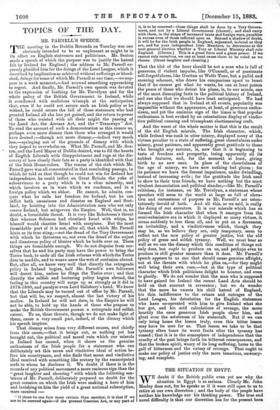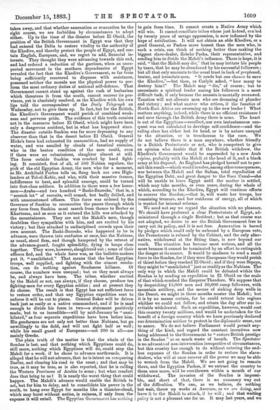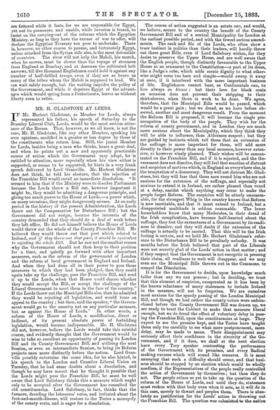THE SITUATION IN EGYPT.
WE doubt if the British public even yet see why the situation in Egypt is so serious. Clearly Mr. John Morley does not, for he speaks as if it were still open to us to retire at our own discretion ; and the body of the people have neither his knowledge nor his thinking power. The true and novel difficulty is that our discretion has for the present been
taken away, and that whether annexation or evacuation be the right course, we are forbidden by circumstances to adopt either. Up to the time of the disaster before El Obeid, the position of the British Government in Egypt was that they had entered the Delta to restore vitality to the authority of the Khedive, and thereby protect the people of Egypt, and cer- tain English, European, and, we regret to add, financial in- terests. They thought they were advancing towards this end, and had ordered a reduction of the garrison, when an unex- pected movement in the southern dependencies of Egypt revealed the fact that the Khedive's Government, so far from being sufficiently recovered to dispense with assistance, possessed neither the morale nor the physical power to per- form the most ordinary duties of national self-defence. That Government cannot stand up against the rush of barbarism which threatens it from the south, cannot recover its pro- vinces, yet is absolutely resolved, as the Khedive with his own lips told the correspondent of the Daily Telegraph on Wednesday, not to give them up. In fact, but for the British, the Khedive's Government would perish of combined weak- ness and perverse pride. The evidence of this truth consists not in the massacre before El Obeid, which might have been only a dangerous accident, but in what has happened since. The disaster outside Suakim was far more depressing to any observer than that in the desert before El Obeid. General Hicks's force had exhausted its ammunition, had no supply of water, and was assailed by clouds of fanatical enemies, who in the beaten condition of the men could, even if there were no submissions, slaughter almost at will. The force outside Suakim was crushed by hard fight- ing. It consisted, first of all, of 500 Nubian regulars, the pick of the old Egyptian Army, the men who for a moment, as Mr. Archibald Forbes tells us, flung back our own High- landers at Tel-el-Kebir, and who, with their massive frames, indifference to heat, and splendid courage, could be turned into first-class soldiers. In addition to these were a few horse- men—Arabs—and two hundred " Bashi-Bazouks," that is, a "scratch lot" of recruits, well armed, but badly drilled, and with unaccustomed officers. This force was ordered by the Governor of Suakim to reconnoitre the passes through which any force from Suakim must march from thence to Berber or Khartoum, and as soon as it entered the hills was attacked by the mountaineers. They are not the Mandi's men, though doubtless they sympathise with him, and are excited by his victory ; but they attacked in undisciplined crowds upon their own account. The Bashi-Bazouks, who happened to be in advance, were thrown into confusion at once, but the Nubians, as usual, stood firm, and though hampered by the retreat of the advance-guard, fought splendidly, dying in heaps close together. They were, however, slaughtered out ; some of their officers fled, and the whole force was, as the bulletin-makers put it, " annihilated." That means that the best Egyptian troops, well supplied, and fighting with the utmost resolu- tion, can do nothing against Soudanese hillmen. Of course, the numbers were unequal ; but so they must always be, and always have been. The tribes, whether excited by the Mandi or not, can always, if they choose, produce ten fighting-men for every Egyptian soldier ; and at present they do choose. The result is that Egypt has not sufficient force to restore order, and that any Egyptian expedition sent to enforce it will be cut to pieces. General Baker will be driven back just as easily as a native commandant, and if he is mad enough to divide his force in two—a statement positively made, but to us incredible—will by mid-January be " anni- hilated," as four separate expeditions have been before him. His gendarmes are not only not better than Nubians, but go unwillingly to the field, and will not fight half as well ; while his small guard of Europeans—not 200 in all—are mainly Greeks. The plain truth of the matter is that the whole of the Soudan is lost, and that nothing which Egyptians could do, still more, nothing which Egyptians will do, could stop the Mandi for a week, if he chose to advance northwards. It is alleged that he will not advance, that he is intent on conquering Darfur, and clearing his road to the coast ; and that may be true, as it may be true, as is also reported, that he is calling the Western Provinces of Arabia to arms ; but what comfort does that bring to us ? It is nearly the worst thing that could happen. The Mandi's advance would enable the British to act, but for him to delay, and to consolidate his power in the south, to hang over Egypt for months like a thunder-cloud, which may burst without notice, is ruinous, if only from the expense it will entail. The Egyptian Government has nothing to gain from time. It cannot create a Native Army which will win. It cannot conciliate tribes whose just hatred, exci.ted by twenty years of savage oppression, is now inflamed by the hope of retribution. It will not obtain an able Khedive, or a good General, or Pashas more honest than the men who, in such a crisis, can think of nothing better than making the biggest slave-dealer, Zebehr Pasha, their representative, and sending him to divide the Mandi's influence. There is hope, it is said, " that the Mandi may die," that he may irritate his people by taxes, that he may be abandoned by his successful followers ; but all that only amounts to the usual trust in luck of perplexed, beaten, and irresolute men. "It needs but one chance to save the Kbedive,"—but then, as Carlyle asked, " how many to destroy him?" The Mandi may " die," of course ; but to assassinate a spiritual leader among his followers is a most difficult task, if only because the assassin is mentally overawed. Taxation will not alienate men who are dreaming of plunder and victory ; and what matter who retires, if the fanatics of North-East Africa are swarming up to the new leader ? What matters anything, indeed, while there is no efficient resistance ? and save through the British Army there is none. The heart is out of the Egyptians—recollect, our own instantaneous con- quest was not calculated to develope self-confidence—and the ruling class has either lost its head, or is by nature unequal to the situation, or is treacherous to the core. We do not believe there is a man anywhere, whether friendly to a British Protectorate or not, who is competent to give an opinion who doubts that if the British withdrew, the Khedive's Government would be superseded by a new Arab regime, probably with the Mandi at the head of it, and a black army at his disposal. As England has pledged herself not to per- mit this result—which would involve, among other consequences, war between the Mandi and the Sultan, total repudiation of the Egyptian Debt, and great danger to the Suez Canal—she will be unable to leave Egypt until the matter is settled, which may take months, or even years, during the whole of which, according to the Khedive, Egypt will continue efforts to recover the Soudan,—that is, will waste her troops, her remaining treasure, and her residuum of energy, all of which is wanted for internal reforms.
We need not say we regard the situation with no pleasure. We should have preferred a clear Protectorate of Egypt, ad- ministered through a single Resident ; but as that course was not adopted, we desire to see the British Government free to carry out its policy, and it is not free. Annexation is barred by pledges which could only be unbound by a European vote, the Protectorate is refused by the Cabinet, and the only alter- native, withdrawal at the fitting time, is now beyond our reach. The situation has become most serious, and all the more because it cannot be terminated by an effort to extinguish the danger at its source. It would be madness to send a small force to the Soudan, for if they were Europeans they would perish of thirst before they reached El Obeid ; and if they were Sepoys, they might be "annihilated " just as readily as the Nubians. The only way in which the Mandi could be defeated within the Soudan is by sending an expedition to El Obeid on the scale of that which crushed the Emperor Theodore. We suppose that by despatching 15,000 men and 20,000 camp followers, with mountain artillery, and the means of sinking deep wells in the Desert, we might in three months master the Mandi ; but it is by no means certain, for he could retreat into regions whither we could not follow, and return the day after our in- evitable withdrawal. Such an expedition, however, would cost this country twenty millions, and would be undertaken for the benefit of a foreign country which we have previously declared our determination neither to protect in the diplomatic sense, nor to annex. We do not believe Parliament would permit any- thing of the kind, and regard the constant incentives now being addressed to the Government to " restore British prestige in the Soudan " as so much waste of breath. The Spectator is no advocats of non-intervention irrespective of circumstances, but this country has enough to do without entering the end- less expanses of the Soudan in order to restore the slave- dealers, who will at once recover all the power we may be able to wrench from the Mandi. We are not going to remain there, and the Egyptian Pashas, if we entrust the country to them once more, will be overthrown within a month of our withdrawal. The invasion of the Soudan is impossi- ble, and short of that, there is no summary way out of the difficulties. We can, as we believe, do nothing but wait, throw up works at Assonan, as we are doing, and leave it to the Mandi to attack, if lie will ; and that waiting policy is not a pleasant one for us. It may last years, and we are fettered while it lasts, for we are responsible for Egypt, yet not its possessors, and unable, while invasion is feared, to insist on the carrying-out of the reforms which the Egyptian Ministry, so long as they have the excuse of war to offer, will declare the Egyptian Treasury too poor to undertake. There is, however, no other course to pursue, and fortunately Egypt, unless attacked from the Syrian side also, is the most defensible of countries. The river will not help the Mandi, his march, when he moves, must be slower than the voyage of steamers from England or Bombay, and at Assouan the cultivated belt narrows, till five thousand Englishmen could hold it against any number of half-drilled troops, even if they are as brave as many of the tribes whom the Mandi is supposed to lead. We can wait safely enough, but the waiting impedes the policy of the Government, and while it deprives Egypt of the advant- ages which would spring from a Protectorate, leaves us without liberty even to retire.












































 Previous page
Previous page